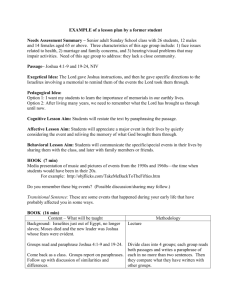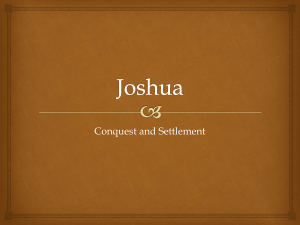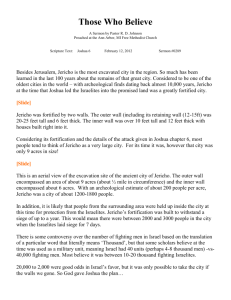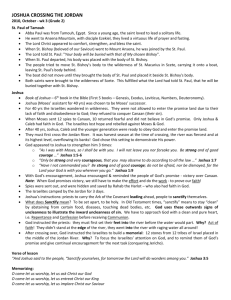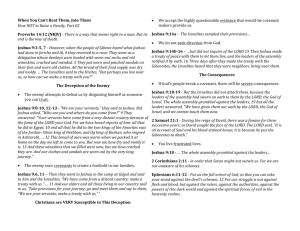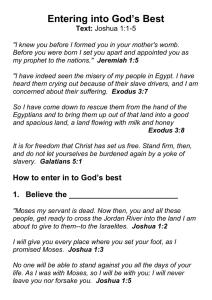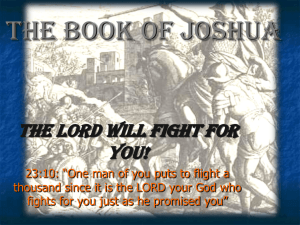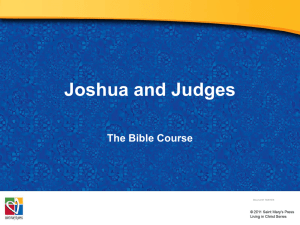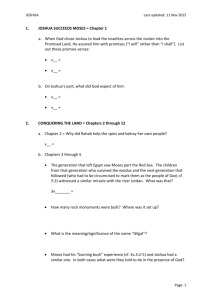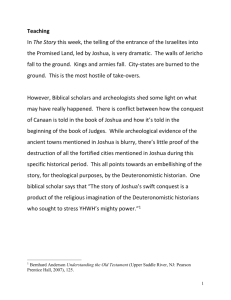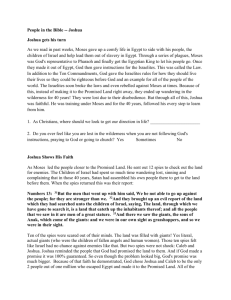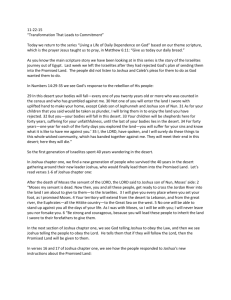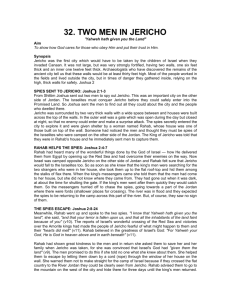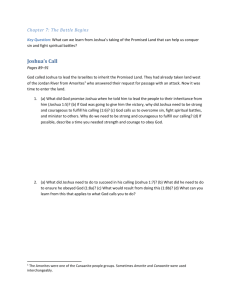“The Story” – Chapter 7: The Battle Begins – October 20, 2013 Zion
advertisement
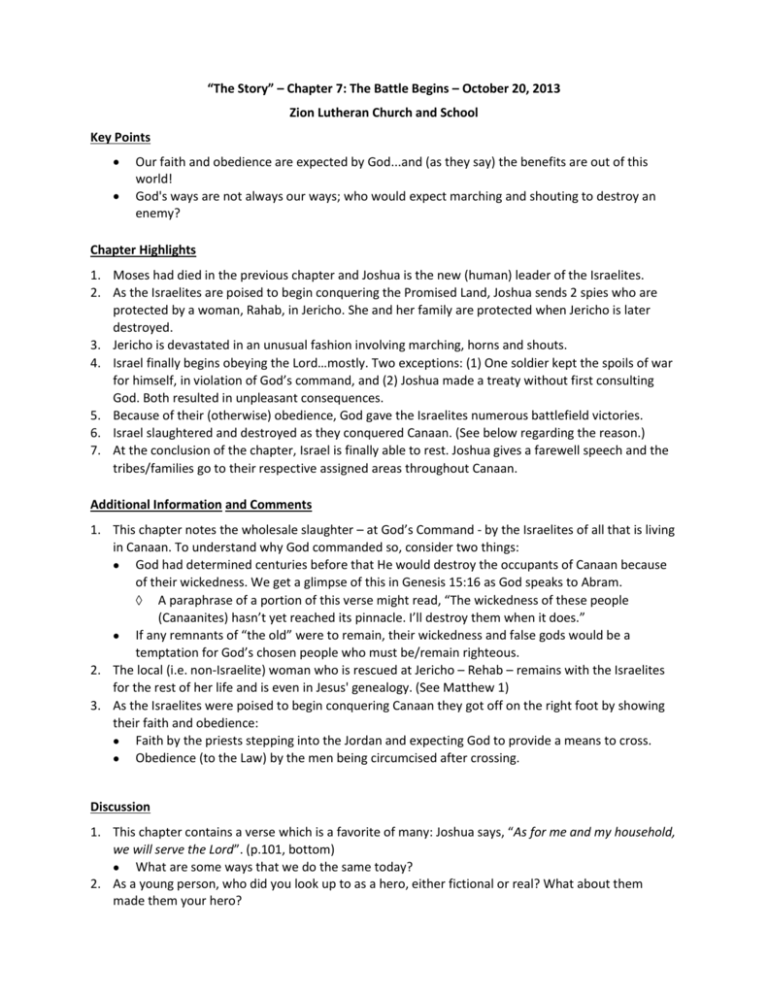
“The Story” – Chapter 7: The Battle Begins – October 20, 2013 Zion Lutheran Church and School Key Points Our faith and obedience are expected by God...and (as they say) the benefits are out of this world! God's ways are not always our ways; who would expect marching and shouting to destroy an enemy? Chapter Highlights 1. Moses had died in the previous chapter and Joshua is the new (human) leader of the Israelites. 2. As the Israelites are poised to begin conquering the Promised Land, Joshua sends 2 spies who are protected by a woman, Rahab, in Jericho. She and her family are protected when Jericho is later destroyed. 3. Jericho is devastated in an unusual fashion involving marching, horns and shouts. 4. Israel finally begins obeying the Lord…mostly. Two exceptions: (1) One soldier kept the spoils of war for himself, in violation of God’s command, and (2) Joshua made a treaty without first consulting God. Both resulted in unpleasant consequences. 5. Because of their (otherwise) obedience, God gave the Israelites numerous battlefield victories. 6. Israel slaughtered and destroyed as they conquered Canaan. (See below regarding the reason.) 7. At the conclusion of the chapter, Israel is finally able to rest. Joshua gives a farewell speech and the tribes/families go to their respective assigned areas throughout Canaan. Additional Information and Comments 1. This chapter notes the wholesale slaughter – at God’s Command - by the Israelites of all that is living in Canaan. To understand why God commanded so, consider two things: God had determined centuries before that He would destroy the occupants of Canaan because of their wickedness. We get a glimpse of this in Genesis 15:16 as God speaks to Abram. A paraphrase of a portion of this verse might read, “The wickedness of these people (Canaanites) hasn’t yet reached its pinnacle. I’ll destroy them when it does.” If any remnants of “the old” were to remain, their wickedness and false gods would be a temptation for God’s chosen people who must be/remain righteous. 2. The local (i.e. non-Israelite) woman who is rescued at Jericho – Rehab – remains with the Israelites for the rest of her life and is even in Jesus' genealogy. (See Matthew 1) 3. As the Israelites were poised to begin conquering Canaan they got off on the right foot by showing their faith and obedience: Faith by the priests stepping into the Jordan and expecting God to provide a means to cross. Obedience (to the Law) by the men being circumcised after crossing. Discussion 1. This chapter contains a verse which is a favorite of many: Joshua says, “As for me and my household, we will serve the Lord”. (p.101, bottom) What are some ways that we do the same today? 2. As a young person, who did you look up to as a hero, either fictional or real? What about them made them your hero? 3. When you hear “man on the street” interviews about what God is like, how do people typically describe Him? That is, what is the common perception people seem to have about God? How is this different from the God who ordered the Canaanites to be totally destroyed? Is this different from the God who, “gave His only begotten Son”? 4. The Israelites were facing an overwhelming challenge as they stood at the bank of the Jordan, poised to conquer Canaan. They conquered through faith and obedience. Have you faced an overwhelming challenge in your life? If so, how did/can you conquer it? 5. How does prayer and Bible reading prepare us to face life’s challenges? To serve God? 6. In the original languages both “Joshua” and “Jesus” mean “Jehovah saves.” How is Joshua’s relationship to Israel similar to Jesus’ relationship to the Church? 7. What basis did Joshua have for being “strong and courageous” (p. 89)? Which assurances that God gives Joshua most strengthen and encourage you? 8. What concerns might Joshua have had as he accepted the reigns of leadership from Moses? 9. Rahab told the two spies: “I know that the Lord has given you this land” (p.90). Upon what was her declaration of faith based? How could she be a prostitute, so easily tell lies, and not be a part of God’s chosen people, yet be attributed with great faith? 10. Review the main points of the covenant that God made with Abraham. (See the summary for Chapter 2, also p. 13.) What examples can you find in this chapter that show God’s faithfulness to its fulfillment? 11. How does God’s command to annihilate entire cities fit into the Upper Story of the Bible? In what way do these battle stories fit into God’s Upper Story? (Hint: review p. 86, especially the first full paragraph.) 12. Some people doubt the Bible because of miracles like Joshua’s “long day” (p. 97). But some people, like Rahab, come to believe in God because of His miraculous works. Discuss how you might respond to the skeptic who discounts the miraculous as myth. 13. What character traits of Joshua most impress you? Which of those would you like to be known for? Summary 1. 40 years after failing the first time God made them ready to conquer the Promised Land, the Israelites were given a second chance. And, by their faith and obedience, they succeeded. 2. God continues building His nation and by the end of chapter 7 the key ingredients are now in place: A people, the Law, God's presence, and now, the physical space (land). 3. Because God was building His nation, all that was unholy had to be purged: the unfaithful in the wilderness for 40 years and, now, the occupants of the Promised Land. For Next Week 1. Throughout the week, consider these words from Joshua: "As for me and my household, we will serve the Lord”. (Joshua 24:15) Also consider how you can apply them in your life.
